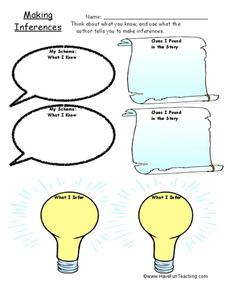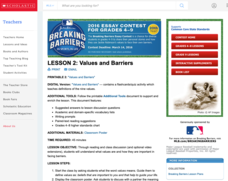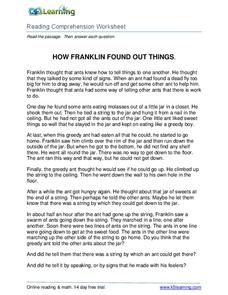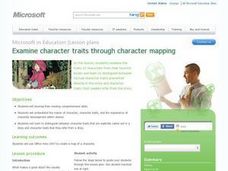Have Fun Teaching
Making Inferences (19)
Good readers use what they know and clues found in a story to make inferences about what a writer wants readers to consider. Here's a graphic that supports this comprehension strategy and asks kids to record what they know, the clues...
K12 Reader
Inference Practice: Where Am I?
Have your pupils try a hand at making inferences. The worksheet includes five different descriptions, and learners must infer where they think the passage is happening and provide some explanation. A straightforward resource for...
Have Fun Teaching
Making Inferences (6)
The story of Petey and Ralphie provides readers with the perfect opportunity to practice using clues in a text to draw inferences. The questions that follow the story direct readers' attention to details that imply rather than directly...
Have Fun Teaching
Making Inferences (17)
Here's a bright inference worksheet that can enlighten the study of any text. Readers fill in a thought bubble with what they know about a story, then map on a scroll clues they found in the text, and record their insights on the...
K12 Reader
Visual Clues
Whether you realize it or not, reading an image and reading a text require similar skills, including the ability to make inferences. For this simple worksheet, children look at a picture of a snowy winter day and answer a series of...
Have Fun Teaching
Where Am I? (15)
Guess the setting in a series of reading passages that allow learners to make inferences. Five short descriptions prompt kids to match one of four settings, based on context clues.
Polk Bros Foundation
I Can Infer Predictions Based on an Analysis of Motive
Use a character or person's motivation as the basis for a prediction of that character or person's next action. Pupils select an individual from their reading, copy a quote, write down an inference about that character's motives, and...
West Corporation
Making Inferences – Use Your Mind to Read!
How can you tell if someone is happy? The lesson works with elementary and middle school scholars to activate their schema and pay attention to details to make inferences in their daily lives, poetry, and other literature. Cleverly...
Have Fun Teaching
Making Inferences (8)
Kids examine the clues provided by a prompt to infer what will happen next. They then illustrate the short story.
Curated OER
Spinelli's Maniac Magee (excerpt): Reading and Critical Thinking Practice
A brief, dialogue-rich passage from Jerry Spinelli's novel Maniac Magee is accompanied by a well-written literacy assessment tool. Thematic content lends itself to age-appropriate discussions about race relations and social justice....
E Reading Worksheets
Predictions Reading into the Future
Practice making inferences about fiction with a language arts slide show presentation. After kids read a few tips about ways to predict the next event in a story, they read several passages and try to find out what will happen next based...
Scholastic
Lesson 2: Values and Barriers
Scholars investigate and discuss the importance of values and how they can be used to break barriers. Small groups work collaboratively to examine the text and draw inferences to answer questions. A writing assignment challenges pupils...
K5 Learning
How Franklin Found Out Things
Franklin learns about the world by making observations, and so do we! A short reading assignment prompts fourth graders to answer comprehension questions about a curious boy and what he notices.
Curated OER
Reading Comprehension: Voice of Nature
Understanding a text can be a very interesting task. Fourth graders read a passage describing the origin of an Aboriginal myth. They answer 11 comprehension questions that require them to pull key details, use context, and think...
Have Fun Teaching
Who Am I? (14)
What's the difference between a clown and a cashier? Use context clues to infer what each character does for a living in five different reading passages. Kids mark their choices on the space provided.
Curated OER
The True Confessions of Charlotte Doyle: Graphic Organizer
After completing the first five chapters of The True Confessions of Charlotte Doyle By Avi, use direct quotes to make inferences about how Charlotte feels about certain characters. Later, when the novel has concluded, revisit the text to...
Roald Dahl
Fantastic Mr. Fox
A fancifully illustrated guide to Roald Dahl's Fantastic Mr. Fox, this series of lessons, activities, and tasks could be used in its entirety or picked apart and used piecemeal. Have young readers investigate the role of dialogue in...
Have Fun Teaching
You Make the Call (10)
What will happen next? Young writers plot what will happen next after studying the clues in four story starters.
Polk Bros Foundation
I Can Infer Motive and Effects for an Action
Help your pupils determine just what makes a character or person tick by zooming in on one character or person. This graphic organizer is dedicated to analyzing one person and asks pupils to infer a personality trait, note down an action...
Polk Bros Foundation
I Can Identify/Infer Motive
Why do people and characters act as they do? Require your class figure out the motivation of two people or characters they read about in a given text. In the short charts, pupils note down who, what they do, and why they do it. After...
Polk Bros Foundation
I Can Sequence Important Events
After reading any short informational or fictional text, ask your class to analyze the important events. They note down three important events on a short timeline, describing the events with either words or drawings. After this, pupils...
Polk Bros Foundation
I Can Infer Motives
Why did they do it? Get to the bottom of complex characters and people by analyzing their motivation. Learners select an action and take a close look at that action in order to infer motive. They then explain why they determined that...
Teacher's Corner
Is There a Wocket in my Pocket?
Accompany Dr. Seuss' Is There a Wocket in my Pocket? with this graphic organizer. Young readers make inferences about why the main character has certain feelings towards the creatures found in the story.
Curated OER
Examining Character Traits through Character Mapping
Some of what we know about a character is directly stated. Some of what we know is inferred by events in the story. Character maps help primary learners recognize the difference. After modeling with a story your class has read, pupils...

























